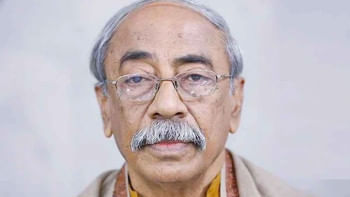JAIL until death

He was actively involved in an act of genocide and crimes against humanity which left 36 people dead in Pirojpur in 1971.
He was 39 and a Muslim League leader then.
Despite committing the heinous crimes, he not only managed to evade trial but also became a two-time lawmaker in Bangladesh whose birth he had vehemently opposed.
It took around 44 years for the law to catch up with Jatiya Party leader Abdul Jabbar. This time his old age saved him from the gallows.
A special tribunal, which tried the JP leader in absentia, yesterday sentenced him to imprisonment until death for committing an act of genocide and crimes against humanity during the 1971 Liberation War.

Though the 82-year-old deserved death penalty, the International Crimes Tribunal-1 gave him relatively lenient punishment considering his old age.
“It is well proved that accused Abdul Jabbar Engineer had direct complicity and substantially contributed and facilitated the commission of such barbarous types of crimes and as such no punishment other than death will be equal to the said horrendous crimes,” said tribunal-1 Chairman Justice M Enayetur Rahim.

“But in the same breath, we cannot overlook the advanced age of the accused, the mitigating factor, which has come up before us for its due consideration,” said Justice Rahim while reading out the summary of the 141-page judgment.
Two other tribunal members are Justice Jahangir Hossain and Justice Anwarul Haque.
The court found Jabbar, the then chairman of Pirojpur's Mathbaria Peace Committee, an anti-liberation force, guilty on all five charges brought against him.
It handed down “imprisonment for life till his natural death” on four charges and 20 years' rigorous imprisonment and Tk 10 lakh fine on the other charge.
If he fails to pay the fine, he will have to spend two more years in jail.
It was the first time the tribunal imposed a fine on a war crimes convict.
The four charges that brought Jabbar jail until death are abetting and instigating the killing of two freedom fighters, and looting and torching of 150 Hindu houses in Kulupara and Nathpara on May 16; participation in the murder of a Hindu man and arson attacks in Phuljhuri on May 17; participation in an act of genocide that left 11 Hindus dead at Naligram on May 22; conspiring and abetting the abduction of 37 Hindus in Angulkata and Mathbaria on October 6 night and the killing of 22 of them.
The other charge he faced is for involvement in forced conversion of around 200 Hindu men to Islam in Phuljhuri in the last week of May 1971.
The sentences would run concurrently, said the court.
“All the crimes listed in the said four charges [charge 1, 2, 3 and 5] relating to genocide and crimes against humanity were massive human rights violations.
“The fierceness of the events of genocide and crimes against humanity were extremely detrimental to basic humanness. It deserves to be evaluated as 'crimes of serious gravity' intending to demean the human civilisation,” said Justice Rahim.
The tribunal tried Jabbar in absentia, as its attempts to have him in the dock failed. It said the accused absconded to evade the process of justice.
“It may be presumed that had the accused not been involved in the crime, he would have certainly appeared before the tribunal to face the trial,” said the court.
It directed the home secretary and the inspector general of police to arrest Jabbar, taking the help of the Interpol, if necessary.
Jabbar was elected a member of Pakistan's Provincial Assembly from the Muslim League in 1964, and a member of Bangladesh parliament from the JP in 1986 and 1988.
He is the fifth person to have been convicted in absentia on war crimes charges.
Sanaul Huq, a senior member of the tribunal's investigation agency, told The Daily Star that they had no information on his whereabouts.
Quoting Jabbar's relative Laiju, our Pirojpur Correspondent reported that the JP leader was last seen at his village home in Mathbaria upazila after cyclone Sidr hit the country in November 2007.
The prosecution yesterday said it didn't get “the expected judgment”. The victims' families also expressed dissatisfaction at the “lenient” sentence.
“We have to accept the judgment though we expected capital punishment,” said Jahid Imam, conducting prosecutor of the case.
He said they would decide in a day or two on whether to challenge the verdict.
In his reaction, state-appointed defence counsel Abul Hasan said, “There is nothing to be satisfied.”
According to the law, a war crimes convict can file an appeal with the apex court within 30 days from the date of pronouncement of the verdict.
Jabbar can file an appeal if he surrenders or is arrested within that period, said Jahid.
On the expiry of the deadline, if he wishes to lodge an appeal, he will have to file an application giving reasons of the delay. It is the apex court's discretion as to whether it will allow him to file an appeal, he said.
Prosecutor Tureen Afroz said, “We are getting two types of verdict from two tribunals. The tribunal-1 took Ghulam Azam's age into consideration whereas the tribunal-2 didn't take into account Subhan's age.”
On February 18, the tribunal-2 handed down capital punishment to 79-year-old Jamaat leader Abdus Subhan for war crimes, saying, “Advanced age of an accused does not readily warrant some mitigation of the sentence.”
Tribunal-1 in 2013 handed down 90 years' imprisonment to former Jamaat ameer Ghulam Azam, considering his age. Ninety-one-year-old Ghulam, however, deserved death penalty, said the court in its verdict.


 For all latest news, follow The Daily Star's Google News channel.
For all latest news, follow The Daily Star's Google News channel. 




Comments